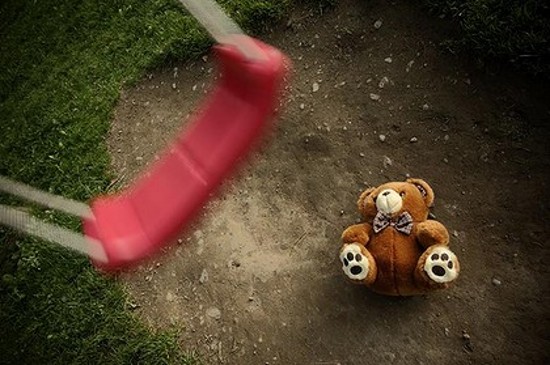 |
|
Parent's worst nightmare ...20,000 children
are reported lost in Australia each year.
Photo: Thinkstock |
Today is International Missing Children's Day. With more
than 20,000 children reported lost in Australia each
year, Claire Low explores one of the worst nightmares
that parents can face.
Isra Aksema's struggles are nothing short of dreadful: Missing
since August 2004 in the Netherlands, Isra was abducted
by her father after he killed her mother. She is 10
years old now and her picture reveals a pretty-in-pink
little poppet, smiling shyly at someone off-camera.
This is one of the many case studies on the International Centre
for Missing and Exploited Children's website.
This website isn't cheery. It also features the now-famous image of
strikingly pretty child Madeleine McCann, as she was at
the time of her disappearance in 2007 in Portugal, along
with an image of how she could look now, aged nine,
complete with distinctive right pupil running into the
blue-green iris.
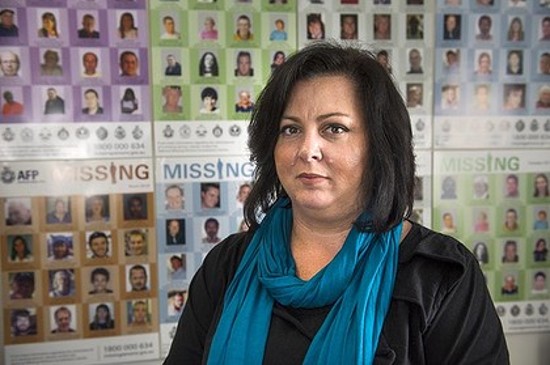 |
|
Rebecca Kotz, team leader of the AFP's
National Missing Persons Coordination
Centre. Photo: Rohan Thomson |
Closer to home, there are the cases of Amelia Toa Hausia, born in
July, 1974, who has been missing since December 1992.
Last seen in a Canberra shopping centre, she vanished after a fight
with her boyfriend and has not been seen or heard from
since 1993 when she contacted her mother in Tonga to say
she was OK.
There is also Elizabeth Herfort, last seen in June, 1980, at the
Australian National University Union Bar in Canberra,
thought to have disappeared after hitchhiking. Another
person who vanished when she was younger, Megan Louise
Mulquiney, would be 44 now and hasn't been seen since
July 1984, after finishing work at Woolworths Woden,
just after noon.
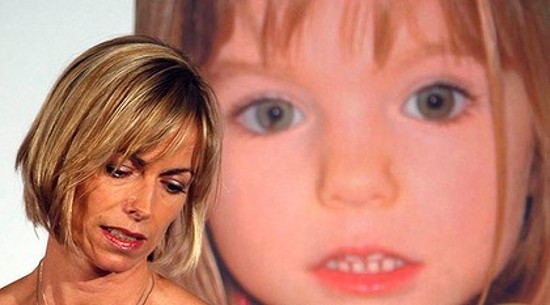 |
|
Kate McCann stands in front of a picture of
her daughter, Madeleine, who went missing
during a family holiday to Portugal in 2007.
Photo: Reuters |
The collection of sad stories and pictures of children frozen in
time is linked to from the Help Bring Them Home website,
which promotes the cause of missing children for
International Missing Children's Day, which is today.
This website takes the form of a hauntingly empty
playground populated only by white balloons. Each
balloon, when clicked on, reveals another vanished
child: curly-haired Jasmine Sbaragli, missing since
January 1, 2009, from Lucca, Italy; grinning Rista
Chanthavixay, missing since March 2009 in NSW;
mop-topped Adrian Stoica Dumitru, lost since February 2,
2007, from Sintesti, Romania; and round-cheeked Abby
Maryk, missing since August 30, 2008, from Winnipeg,
Manitoba, Canada. Sad-eyed Fazli Saeem has been lost
since July 14, 2009, from Athens, Greece. Cameron
Leishman of NSW, missing since September 2008, squints
awkwardly into bright light.
Lost boys and girls are plentiful enough: of the 35,000 people
reported missing in Australia every year, about 20,000
of those are younger than 18. The good news, though, is
the vast majority aren't gone forever: ''In 99.5 per
cent of cases, they [police] find the child,'' Rebecca
Kotz says.
Kotz is team leader at the Australian Federal Police National
Missing Persons Coordination Centre. She is kind and
maternal - in fact, a mother of two herself. Her
darlings are an 11-year-old daughter and a 15-year-old
son.
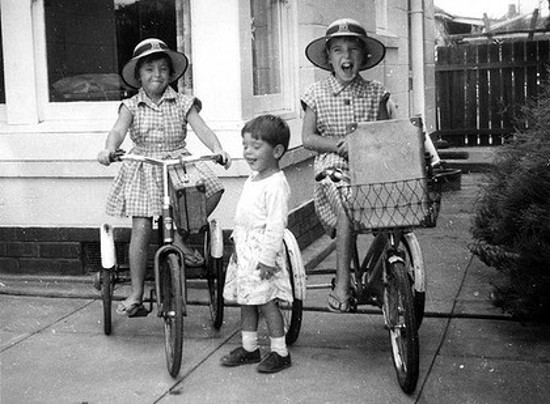 |
|
The Beaumont children, who disappeared from
Adelaide in 1966. |
As part of her role at the centre, Kotz meets with Australian
families who are missing a loved one.
''I think they're incredible people,'' she says. ''If any of my
kids went missing, I would be a basket case.
''I don't know how some of [the families] survive, I really don't.
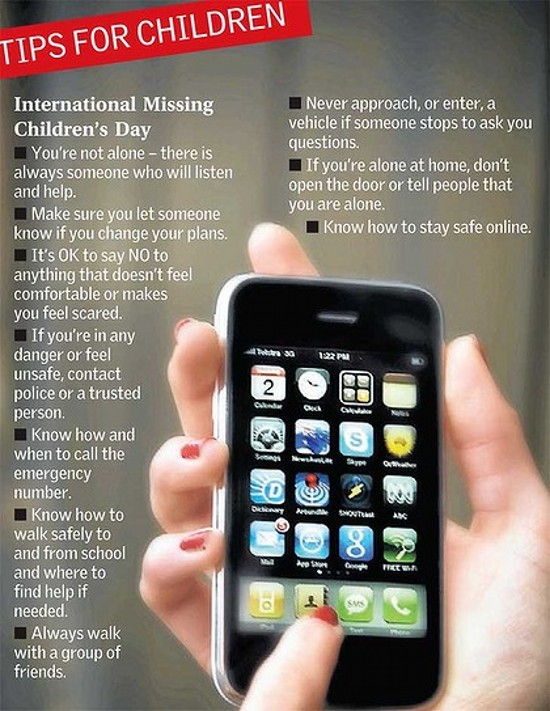 |
|
Tips for children to stay safe. |
''I can tell you, if it happened to me, I don't know how I would
carry on. I don't know how I would wake up and breathe
the next day. It would be horrific.''
Explaining what parents should do if faced with the predicament of
a missing child, she says there's absolutely no need to
wait.
One myth in Australia is that one should wait 24 hours to report
anyone missing.
''It's probably the worst myth,'' Kotz says. ''You don't have to
wait any time. If you have fears for the safety of a
loved one, you go straight to police and report them
missing.''
In fact, earlier is better.
''As soon as the trail goes cold, it's harder to trace somebody,''
Kotz says.
Another good thing - in Australia, children usually go missing for
an innocent enough reason: a failure to tell their
parents of a change of plans, according to Kotz.
Parental abduction figures in Australia are low with the
family court dealing with about 140 cases per year.
Stranger abductions are rarer still.
''We live on a massive island,'' Kotz says. ''There's not a long
way to take them unless you're a parent and you've got a
passport in your hand. It's very rare to find a Daniel
Morcombe case.''
Daniel was a Sunshine Coast teenager who went missing in 2003. His
remains were found, and a Perth man taken into custody
and charged with his murder, last year. His family set
up a foundation in his name to teach personal safety to
the young and vulnerable.
But, again, the chances of a case like this occurring are slim. In
her time at the centre, the number of stranger abduction
cases Kotz has dealt with she could count on one hand.
''We're lucky in Australia. Our main area of concern is … a child
in care who is a regular runaway,'' Kotz says,
explaining that a lot of the runaways in question are in
care services or foster homes, struggling with life and
rebelling. The child tends to simply be out with friends
rather than wherever they are supposed to be waiting to
be picked up.
Police searching for missing children take each report seriously.
They take as much information from the parents as
possible, then chase the child's friends, schools,
sporting associations, and anyone the child could be
connected with.
''All their procedures are very thorough,'' Kotz says. ''They don't
stop until they find the child.''
The child is not thought to be dead until a body is found. A
coroner can make a ruling, usually after at least seven
years, on evidence of life, not whether the child is
alive or dead. As long as the child is missing, the case
remains open. Here, Kotz cites the case of the Beaumont
children, who famously went missing in the 1960s. New
work had been done on parts of the investigation as
recently as last year.
''That case will not go away because it's an absolute mystery as to
whether those kids are now adults, not realising who
they were,'' she says.
At this point, Kotz becomes impassioned.
''Can I say one thing: the worst thing any media can do - and it's
really hard for families to deal with - is put the word
''closure'' to anything.
''Whether they find a body, whether they find the child alive and
well, whatever the case may be, it's never closure. Let
me make that perfectly clear.''
For the families, locating a child or a body only opens up more
questions. For instance, according to Kotz, a girl,
missing for two decades, was found fine and well, but
because of her personal issues, was unable to face her
family's questions once reunited with them.
''That is a success story, but it's still not closure,'' she says.
Mentioning Daniel Morcombe again, the locating of the boy's remains
and having something to bury likewise was not closure
for his family, who had ''been through living hell''.
''It opens up to [questions like] what did he go through in his
last moments and what happened to him?
''They have to live with that for the rest of their life.
''The one thing families say to me time and time again is people
saying, in the media, that they've finally got closure,
is the worst thing.''
It's almost impossible to imagine the profound pain families of
missing children must feel. Kotz describes her own heart
palpitations and immense emotions when her daughter,
then aged two, went missing. The girl turned up quickly
on a queen-sized bed at David Jones among a bunch of
teddy bears.
But for those stuck in limbo, not knowing, fearing the worst, what
must it be like?
Psychologist David Gorovic, of Canberra Counselling Services, says,
''The key experience is they are in limbo. To experience
grief, you need a definite loss. In this situation,
there is nothing definite.
''It's distressing and devastating because the brain doesn't like
uncertainty, doesn't like gaps. It fills gaps with
imagination: [parents] imagine all sorts of horrible
things. People imagine the worst and imagination becomes
reality. Then they react to what they imagine, not to
what happened.''
He finds the known can be easier to deal with than the unknown.
''It's still distressing and painful and traumatic, but there is an
option to move on,'' he says. ''Often people with this
sort of problem get stuck and the problem becomes their
life.''
Blame can become a problem for those who try to re-write history in
their mind, whether self-blame (''oh, if only I had left
five minutes earlier''), or blame directed at the
child's school or the child's other parent.
Gorovic's approach to trying to help someone in this situation is
to set up some structure for the person hurting and
struggling with no answers.
Practical concerns can be addressed - ''like if it keeps them awake
at night and because they can't sleep, they can't
function. Or maybe they're always in a state of alert:
walking down the street then panicking.''
Gorovic's aim would be to help the parent or affected person get on
with their lives: ''Not to forget about it, not to get
over it, but to be able to find meaning in their own
life once the child is gone. To live their own lives
even though the child is not there.
''One approach I take when somebody has lost a loved one is to say,
'What would this person want from you? Would they want
you to go on crying and put your life on hold? Would
they want you to do something else?' '' |






